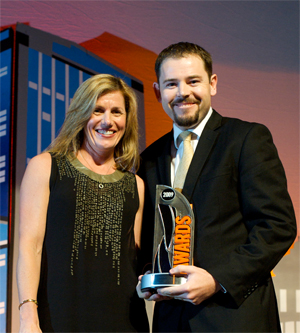SA great for tech start-ups: Memory Box

profile While the fight is heating up between Sydney and Melbourne to be the centre of ICT services in Australia, Trevor Glen, managing director of collective online storage start-up Memory Box, thinks South Australia is the place to be for tech start-ups.

Trevor Glen, right, accepting an iAward from Microsoft and Australia general manager Tracey Fellows (Credit: Trevor Glen/Memory Box)
"There's a lot of support we get here in South Australia, and combined with the cost of living, South Australia is a really attractive place to start a business and a tech business as well," he said.
"We've been involved in the Innovate SA programs which provide training courses for businesses. Their venture capital course was completely free of charge and was part of the reason why we got investment. It gave us the lay of the land and allowed us to get our company investable."
The training provided in media, marketing and finance were all new to Glen.
"These training courses helped us to understand what was required in the world of business so that we could combine our expertise in the software industry with a good business grounding in a manner that didn't cost us the earth," he said.
Being included in this year's South Australia exhibit at the IT conference CeBIT, was another plus.
Memory Box
Glen left his role as a software engineer at mobile phone giant Motorola back in 2005 to begin working on the Memory Box idea as his own business. Memory Box is a collective secure storage service that works by splitting each file into 100 packets and distributing it across the Memory Box customer base network. Each customer holds a portion of each others' files. The network controller monitors the distribution of these files as well as their availability, making sure every piece of data is accessible.
The security of the data is ensured because the information is divided in such a way that it is useless without the remaining parts. The redundancy used by Memory Box means that almost 50 per cent of the file would have to be lost before the file itself could become corrupted.
Glen said he is "a big believer in open source", with all development done on Ubuntu boxes and servers. However, all Windows testing is done using virtual machines running Windows. Glen said these were a "god send" because the organisation didn't have to buy hardware for testing, something Microsoft had helped the company out with.
"Obviously if you're doing commercial software, Windows is still the biggest platform out there and biggest market share so you can't ignore it," he said. "We're in the BizSpark program with Microsoft and that's helped us immensely as well. The access to the tools that you get and the access to the market you get is fantastic."
Precious memories
The core consumer focus of the business, according to Glen, is mums and dads who are worried about losing digital photos stored on their computers.
"It's really about backing up those photos," he said. "So many digital photos are taken these days and it's about taking those digital memories and protecting them from fire and theft — now that everyone's got it all on the computer it's a prime opportunity for thieves to take it away from you."
Glen joked that the type of photo Memory Box stored didn't matter as no one but the owner of that photo could see it.
"Whatever you want to take photos of is none of your business. We can't see them and we don't want to see them."
The Memory Box back-up network currently holds around 600 gigabytes of what the company likes to call "precious memories", having added around 100GB in the last month alone.
The enterprise side of the business was still being developed, but Glen said he believed e-health could utilise the service Memory Box offers.
"I think we could install a server within a hospital and utilise the spare hard disk space of all the computers around the hospital to store patient records and yet it would still be secure from prying eyes," he said.
"Health is an obvious one because of the privacy nature. [Memory Box] makes it a lot harder for a hacker to get in and get access to your backups and it's a more secure solution because it's all distributed around the network."
The roller-coaster
Winning the best start-up award at the iAwards last year and taking out the tools and infrastructure category at the Asia Pacific ICT Alliance Awards were highlights for the start-up, Glen said.
"That was fantastic to be able to stand out in front of your peers, it was really great for us to get the pat on the back and I think that really helped us get the investors," he said. "Starting a start-up is a real roller-coaster — you might win an award one day and find out you're running out of funds the next day. So to get those wins really helps the process."
Memory Box has been reliant on public grants such as the Commercialising Emerging Technologies grant — for which the company gained $114,000 in funding — to keep the company going, but Glen said the three-man operation is just about ready to be publicly listed and is looking for investors.
So what advice does Glen have for other technology start-ups?
"One of the best pieces of advice I would give to other start-ups — especially if you come from a technology background — is to find someone who can do the sales and marketing as quickly as you can," he said. "Having someone on board who understands marketing — even if they don't understand technology."
"It's helped us take our product from a no-named technology idea to Memory Box, which has a brand and means something."